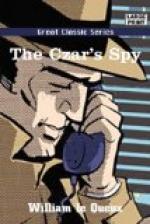“Why not?”
“Well, Gregg will tell you,” he said. “He knows, perhaps, more than I do. But,” he added, “they may not, of course, be the same people.”
“I first met them yachting over at Algiers,” Jack said. “And then again at Malta, where they seemed to have quite a lot of friends. They had a steam-yacht, the Iris, and were often up and down the Mediterranean.”
“Must be the same people,” declared the Major. “Leithcourt spoke once or twice of his yacht, but we all put it down as a non-existent vessel, because he was always drawing the long bow about his adventures.”
“And how did you first come to know him?” I asked of the Major eagerly.
“Oh, I don’t know. Somebody brought him to mess, and we struck up an acquaintance across the table. He seemed a good chap, and when he asked me to shoot I accepted. On arrival up at Rannoch, however, one thing struck me as jolly strange, and that was that among the people I was asked to meet was one of the very worst blacklegs about town. He called himself Martin Woodroffe up there—although I’d known him at the old Corinthian Club as Dick Archer. He was believed then to be one of a clever gang of international thieves.”
“When I first met him he gave me the name of Hornby,” I said. “It was in Leghorn, where he was on board a yacht called the Lola, of which he represented himself as owner.”
“He left Rannoch very suddenly,” remarked Bartlett. “We understood that he was engaged to marry Muriel. If so, I’m sorry for her, poor girl.”
“What!” cried Durnford, starting up. “That man to marry Muriel Leithcourt?”
“Yes,” I said. “Why?”
But his countenance had turned pale, and he gave no answer to my question.
“If these same Leithcourts are really friends of yours, Durnford, old fellow, I’m sorry I’ve said anything against them,” the Major exclaimed in an apologetic tone. “Only the end of my visit was so abrupt and so extraordinary, and the company such a mixed one, that—well, to tell you the truth, the people are a mysterious lot altogether.”
“Perhaps our Leithcourts are not the same as those Jack knows,” I remarked, in order to escape from a rather difficult situation; whereupon Durnford, as though eager to conceal his surprise, said with a forced laugh, “Oh! probably not,” and reseated himself at table. Then the Major quickly changed the topic of conversation, and afterwards he and his friend passed along to their table and sat down to eat.
I could not help noticing that Jack Durnford was upset at what he had learnt, yet I hesitated just then to put any question to him. I resolved to approach the subject later, so as to allow him time to question me if he wished to do so.




